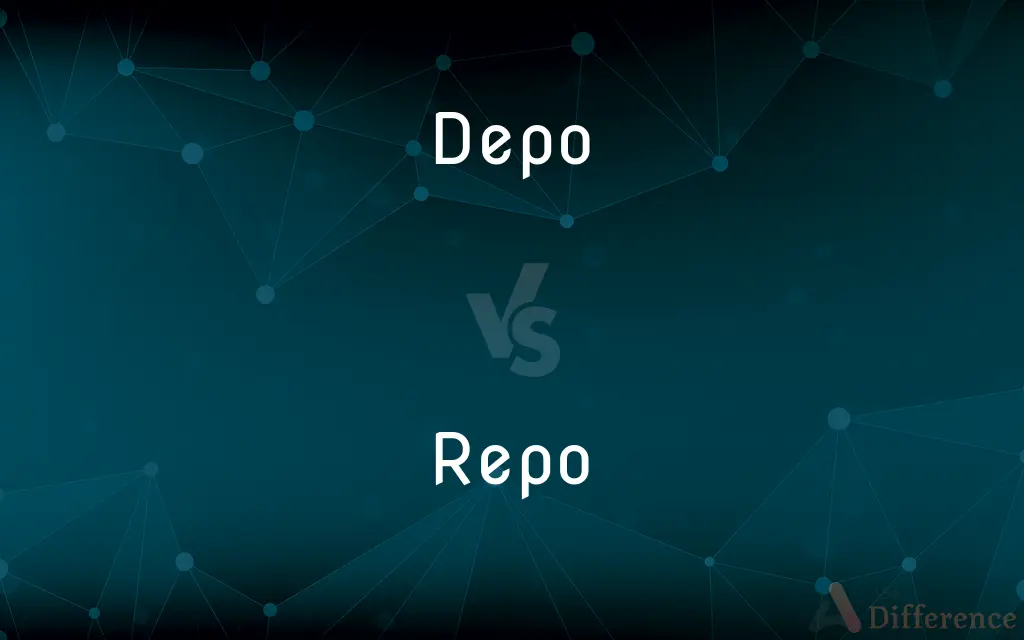Depo vs. Repo — What's the Difference?
By Tayyaba Rehman & Urooj Arif — Updated on March 29, 2024
Depo refers to a storage location for goods or a short term for a depot injection in medicine, while Repo (Repurchase Agreement) is a financial transaction involving the sale and future repurchase of securities.

Difference Between Depo and Repo
Table of Contents
ADVERTISEMENT
Key Differences
Depo, short for depot, is commonly used to describe a storage facility where goods are kept for distribution or a type of long-lasting injection in medical contexts. These depots are crucial in supply chain management, providing a centralized location for goods before they are distributed to retailers or consumers. On the other hand, a repurchase agreement, or repo, is a financial transaction where one party sells securities to another with the agreement to buy them back at a specific price on a future date. This is often used for short-term borrowing.
While depots are physical locations or refer to a method of medication delivery, repos are short-term financial agreements essential for liquidity in the financial markets. Depots play a key role in logistics and healthcare, ensuring products and medications are available where and when needed. Conversely, repos provide financial institutions with a mechanism to manage cash reserves, allowing for the short-term investment of surplus funds or the obtaining of quick liquidity.
The operation of a depo involves warehousing, inventory management, and logistics to ensure the safe and efficient storage and distribution of goods. In healthcare, depot injections release medication over time, offering an alternative to daily pills. Repos, however, require careful risk assessment and management, as they involve collateralized loans secured by securities. The interest rate on a repo, known as the repo rate, is a key indicator of the liquidity in the financial system.
Depos can be public or private and vary in size and function, from small local warehouses to large distribution centers. Depot injections are administered in controlled healthcare settings. In contrast, repos are primarily used by financial institutions, including banks, government securities dealers, and investment funds, to manage their short-term financing needs or invest short-term cash surpluses efficiently.
Depo refers to storage locations or a medical term for certain injections, focusing on the physical or health-related management of goods and medications. Repo, however, is a financial concept, highlighting short-term agreements in the securities market for liquidity and investment purposes. Both play vital roles in their respective fields but operate within entirely different contexts and mechanisms.
ADVERTISEMENT
Comparison Chart
Definition
Storage location for goods or a type of long-lasting injection.
A financial transaction for short-term borrowing or investing involving the sale and repurchase of securities.
Primary Use
Logistics, distribution, and healthcare.
Financial markets for liquidity and short-term financing.
Key Elements
Warehousing, inventory management, logistics, medication delivery.
Securities, interest rates (repo rate), collateral, liquidity management.
Participants
Manufacturers, retailers, healthcare providers.
Banks, government securities dealers, investment funds.
Function
Ensures the availability and distribution of goods or the delivery of medication over time.
Facilitates short-term borrowing or investment and liquidity management in the financial system.
Compare with Definitions
Depo
A public transit depot where buses are parked and maintained.
Buses return to the depo at night for cleaning and repairs.
Repo
A mechanism for central banks to control the money supply.
The central bank used repos to inject liquidity into the banking system.
Depo
A distribution center that stores products for regional delivery.
The furniture company's depo housed items ready for delivery across the state.
Repo
A tool for managing short-term liquidity needs.
Facing a cash crunch, the firm used a repo to secure quick funding.
Depo
A medical term for depot injection, releasing medication over time.
She received a depo shot for continuous medication release.
Repo
A short-term investment option for money market funds.
The fund temporarily placed its excess cash in a repo.
Depo
A railroad depot, a station with facilities for loading and unloading freight.
The old railroad depo now serves as a museum.
Repo
A financial arrangement where a bank sells government bonds to obtain overnight funding.
To meet its reserve requirements, the bank entered into a repo.
Depo
A military depot for storing arms and ammunition.
The army’s depo was strategically located away from civilian areas.
Repo
An agreement involving corporate bonds as collateral.
To finance its short-term operations, the corporation engaged in a repo using its corporate bonds.
Repo
A repurchase agreement.
Repo
Repossession of merchandise or property from a buyer who has defaulted on payment.
Repo
Repossessed merchandise or property.
Repo
(informal) repossession Most commonly of a vehicle, house or condominium.
Can you do a repo tommorrow? It's an SUV in Springfield.
Repo
(informal) repositioning
That cruise ship starts its repo tomorrorow; it's going to the Caribbean for the winter.
Repo
A repurchase agreement: a type of derivative which allows a borrower to use a financial security as collateral for a cash loan at a fixed interest rate.
Repo
Senseid|en|computing}} {{clipping of repository
Repo
Repossess
I had my car repoed when I became unable to keep up the payments.
Common Curiosities
What is a depo?
A depo refers to either a storage location for goods or a type of long-lasting medical injection, depending on the context.
How does a repurchase agreement work?
In a repo, one party sells securities to another with an agreement to repurchase them at a later date for a higher price, effectively securing a loan.
What role do repos play in the financial market?
Repos provide liquidity, allowing financial institutions to manage short-term financing needs or invest excess cash temporarily.
Can depots be used for perishable goods?
Yes, specialized depots with refrigeration are used to store and distribute perishable goods like food and pharmaceuticals.
How does a depot injection work?
A depot injection releases medication over time, offering an alternative to daily doses and ensuring consistent medication levels.
What differentiates a repo from a loan?
A repo is secured with collateral (securities), intended for very short-term borrowing, often overnight, with the specifics of sale and repurchase agreed upfront.
Why are depots important in logistics?
Depots centralize storage, facilitating efficient distribution and inventory management in supply chains.
Can individuals participate in repurchase agreements?
While repos are primarily used by financial institutions, some investment platforms may offer individuals indirect exposure to repo markets through money market funds.
How do central banks use repos?
Central banks use repos to manage the money supply and influence short-term interest rates, thereby implementing monetary policy.
What are the risks associated with repos?
Repos carry the risk of counterpart default and the potential for loss if the collateral's value decreases significantly.
What types of securities are typically used in repos?
Government bonds are the most common, but repos can also involve corporate bonds, mortgage-backed securities, and other marketable securities.
Are there different types of repos?
Yes, including overnight repos, term repos, and open repos, each differing in duration and terms.
What happens if a party fails to repurchase in a repo?
The lender can sell the collateral to recover the funds, but this may lead to losses if the market value of the securities has fallen.
How do logistics companies use depots?
Logistics companies use depots for storing, sorting, and redistributing goods as part of their supply chain operations.
How does the repo rate influence the economy?
The repo rate affects the cost of borrowing in the financial markets, influencing overall economic activity by affecting liquidity and interest rates.
Share Your Discovery

Previous Comparison
Spat vs. Spitted
Next Comparison
Waived vs. WavedAuthor Spotlight
Written by
Tayyaba RehmanTayyaba Rehman is a distinguished writer, currently serving as a primary contributor to askdifference.com. As a researcher in semantics and etymology, Tayyaba's passion for the complexity of languages and their distinctions has found a perfect home on the platform. Tayyaba delves into the intricacies of language, distinguishing between commonly confused words and phrases, thereby providing clarity for readers worldwide.
Co-written by
Urooj ArifUrooj is a skilled content writer at Ask Difference, known for her exceptional ability to simplify complex topics into engaging and informative content. With a passion for research and a flair for clear, concise writing, she consistently delivers articles that resonate with our diverse audience.
















































